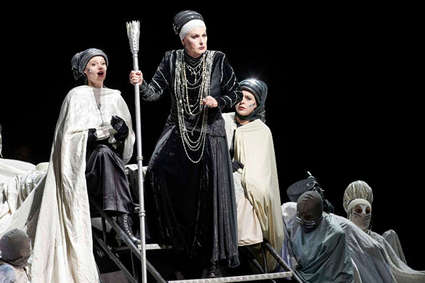| Opera Reviews | 3 May 2024 |
A thrilling evening of Straussby Moore Parker |
|
| Strauss, R: Elektra
Vienna State Opera 11 September 2020 |
|

Doris Soffel (Klytämnestra), Ensemble
|
|
|
Under it’s new Director Bogdan Roščić, the State Opera this week unveiled an audacious season - with a bold line-up of ten productions new to Vienna, and a planned turnover of up to five works in a seven-evening cycle. Business as usual - and extraordinary, considering the restrictions and uncertainties posed by the on-going Covid crisis. Harry Kupfer’s 1989 Elektra production initially marked the 125 anniversary of Richard Strauss’ birth, and subsequently returned frequently though to 2012 with a kaleidoscope of leading casts. It was replaced in 2015 by a Laufenberg production which prevailed until February of this year. The current intent was a revival of the 1989 version under the direction of Kupfer himself - but he, alas, passed away on December 30 of last year. His long-time associate, Angela Brandt undertook the project in his place - and the result is no less than outstanding. Indeed - as an entire experience (and having seen the original on several occasions) - this particular performance appeared supreme in credibility, interaction, and an intensity that drove the evening to become a truly compelling event. The three (well-matched) female leads were all giving role debuts here, with Derek Welton making his State Opera debut as Orest, and Franz Welser-Möst undertaking his first Elektra here - following a general absence from the house of six years. As if expanding upon his success this Summer in Salzburg (see our review here), Welser-Möst gave a definitive interpretation on this occasion - combining a rare transparency, command, and sheer affinity with the score, while weaving a sonic carpet of the finest threads upon which the drama was transported. The Vienna Opera Orchestra appeared to relish every note of Strauss’ pages - as if in gratitude for the opportunity to again make music in this great house. A combined sense of energies between stage and pit were key to this revival’s impact, with the synthesis between supreme music-making and the evident attention to staging essentially overriding any intrinsic deficiencies in sheer vocal prowess. Across the entire cast, rare attention was evidently given to the vital importance of text and clear enunciation. Undertaking the title role, Ricarda Merbeth enjoys an illustrious history in the house, progressing from roles like the High Priestess in Aida to Strauss’ Daphne, The Marschallin, and Chrysothemis. If a touch meager vocally in her initial scene, the instrument unfolded as the evening progressed, showing enduring stamina and providing some adequately powerful (if soft-grained) phrases as well as numerous finely-spun segments (the exquisitely shaped “Recognition Scene”, being just one). Merbeth’s powerful figure - yet acute physical agility - combined with an unflinching focus to make this an Elektra to remember. Camilla Nylund appeared most recently in the house as a radiant Kaiserin in last season’s Die Frau ohne Schatten revival, and as Chrysothemis her exceptional qualities as an impassioned - indeed, here frenetic - performer were undeniable. But the role presents a daunting vocal challenge - without some of the bonbons which an Elektra enjoys to potentially balance any shortcomings. Nylund gave her all, but ultimately left the impression that there are Strauss parts in the wings which more comfortably suit her attributes. This production has witnessed a gamut of Klytämnestras ranging from Brigitte Fassbaender, of the premiere cast, through Christa Ludwig, to Agnes Baltsa, who appeared in the 2012 series. Doris Soffel’s reading turned out to be something quite disparate - but nevertheless captivating. Of credible maturity for the role, and with an instrument now wayward in sonic emission, this creation is proof of stage technique, personality, and a compelling capacity for dramatic expression winning the day. Whether flailing at her retinue or covertly stealing a sideward glance at Elektra’s reactions, this was an imposing reading. As Orest Derek Welton well-filled this more traditional embodiment of the character (in total contrast to the recent Salzburg concept of the figure) - displaying fine stature and a sympathetic stage presence. He occasionally seems to take the breath “off the voice” in phrases which are then inclined to pulsate and oddly disconnect, but as his great scene with Elektra progressed, so did the full sustaining support of his bronzed, well-projected tone. A new valuable ensemble member for the house, who received a deservedly warm welcome at the curtain. Aegisth offers limited opportunity for any artist to shine but Jörg Schneider (familiar from the Laufenberg production) scored with an inimitable combination of physical presence and biting diction, The enormous, decapitated statue of Agamemnon dominates throughout - with a chillingly perennial relevance in a production as equally compelling (while possibly compacter and more subtly illuminated) as its 1989 original. |
|
| Text ©
Moore Parker Photo © Wiener Staatsoper / Michael Pöhn |
|







